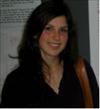Erin Kara leads research showing impact of likely tidal disruption on normally dormant supermassive black hole.
A normally dormant supermassive black hole (SMBH) tearing apart a nearby star is reported in research led by Gates Cambridge alumna Erin Kara.
The study is reported online in Nature this week. It analyses X-ray data collected as the star experienced this ‘tidal disruption event’ and accreted onto the SMBH, and opens up a new way of studying gravity effects in normally dormant black holes and, possibly, measuring their spin.
Although current understanding of space-time around SMBHs is based on actively accreting black holes, 90 per cent of SMBHs are dormant. Tidal disruption events offer an opportunity to study this large population of normally dormant SMBHs.
In the study, Erin [2012] and colleagues reanalyse previously available X-ray data for a likely tidal disruption event that was detected in 2011, the so-called ‘Swift J1644+57’, using a technique known as X-ray reverberation mapping. They report observations of X-ray echoes, or reverberations, from iron photons. Analysis of these reverberations reveals that they are from the inner part of an accretion flow, with the reflecting gas flowing outwards at up to half the speed of light.
Although the authors do not estimate the spin of the black hole, they propose that, with future improvements in the modelling of such flows, it will be possible to measure black hole spin not only in the 10 per cent of persistently accreting black holes, but also in the 90 per cent of dormant black holes in the Universe.
Erin did a PhD in Astronomy at the University of Cambridge and is now a Hubble and Joint Space Institute Fellow working at the University of Maryland Astronomy Department and NASA Goddard Space Flight Centre.
*Illustration credit: NASA/Swift/Aurore Simonnet, Sonoma State University.

Erin Kara
- Alumni
- United States
- 2011 MPhil Physics (Astronomy)
2012 PhD Physics (Astronomy) - St John's College
After graduating from Barnard College in May 2011, I moved from New York City to Cambridge to start my MPhil degree in Astrophysics. My time here has been wonderful, and I am so glad for the opportunity to stay on for the PhD. I work at the Institute of Astronomy, under the advisement of Andy Fabian. Specifically, I am looking at observations of X-ray variability in accreting black holes systems, in order to understand more about the geometry and dynamics of these extreme environments. In addition to my research, I have enjoyed getting involved in astronomy outreach events at my department, and am continually impressed and inspired by the curious Cambridge public. Apart from astronomy, I am completely smitten with the Cambridge music scene, and have also taken up badminton. I look forward to my next three years in Cambridge.












